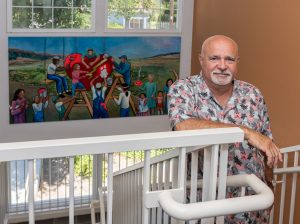BY DEAN ZATKOWSKY (Contributor) | LEER EN ESPAÑOL
People Helping People (PHP) is the primary provider of human and social services in mid-Santa Barbara County, serving Buellton, Solvang, Santa Ynez, Ballard, Los Olivos, Los Alamos, and the Gaviota Coast. Limited services are provided in the Lompoc Valley.
“We’re here to help people in financial or healthcare crisis, and to help people become self-sufficient,” said PHP CEO Dean Palius. “It’s a ‘hand-up’ organization.”
Founded in 1992, PHP’s vision has always prioritized the goal of self-sufficiency, while recognizing that people sometimes need help along the way. As Palius puts it, “Some people cannot pull themselves up by their own bootstraps, because they don’t even have boots.”
With more than 20% of the area’s overall population living at or near Federal poverty levels, PHP offers programs and services in four categories:

PHP food programs serve about 1,150 clients. “It’s a basic supplemental food program with multiple distribution sites. We just received a federal grant to remodel the downstairs into a food pantry. We’ve never had a full pantry before, so now we can help people who miss the weekly deliveries.”
The organization also benefits from Albertson’s Fresh Rescue program, picking up about-to-expire food for fast distribution to needy families. “We set up tables in our driveway once a week and people who need food can come stand in line and pick some up. One of the reasons to remodel downstairs is to refrigerate and freeze foods. We are always in need of food, and now donors will know they can deliver food here and we can store it longer term.”
PHP also serves as a certified enroller for Cal Fresh, but it’s harder than you might think to get people to enroll for benefits they need.
“First of all,” says Palius, “there’s a stigma attached to food stamps, which aren’t literally ‘stamps’ anymore; it’s a debit card. People get self-conscious, so that’s one thing. Some people don’t like dealing with the government; some families are only partially documented, so even though the kids qualify, the adults are afraid to deal with government or government-related programs.”
There is also the challenge of communicating with people who are struggling, and sometimes suspicious. “The local papers are great and totally supportive of us, but the people who need us aren’t reading them.”
Providing emergency shelter is another key component of PHP’s mission, along with preventing homelessness.
“We have provided emergency shelter for a long time. But we don’t have a shelter here – it’s extremely expensive. We have used motels to provide emergency shelter. Most of that is provided to domestic violence victims, mostly women and children. So much, that we came to see the emergency shelter needs as a symptom. Domestic violence is the actual problem, so we developed domestic violence prevention programs.
Recognizing that preventing homelessness is a lot cheaper than remediating homelessness, PHP also maintains a small fund to help people in temporary financial crisis avoid eviction.
“95% or more of our clients are working,” says Palius. But like 40% of Americans, they have no savings at all. They are living paycheck to paycheck, one injury or car repair away from disaster.
We asked Palius how the challenges have changed during his 24 years at PHP.
“The overarching challenges haven’t changed. Raising money every year – almost from scratch – to keep the programs running: That hasn’t changed. The big changes come with periodic recessions. The last recession, and I’ve been here long enough to have seen several recessions, was exceptionally difficult for this organization.”
Palius explained the “double-whammy” that comes with an economic recession: “At least a third of our work is in basic needs; food distribution, shelter, homelessness prevention, domestic violence safety, and domestic violence prevention. During a recession, demand increases while donations are impaired.” Palius is grateful that things weren’t worse. “Local foundations saw it coming and stepped up – and the Santa Barbara Foundation was a leader – so it slowed the impact for a couple of years, but reductions in funding eventually hit us hard.”
“We tightened our belts during the recession and kept them tight. It’s caused some staffing issues over time, but we’re in a position now where we have some reserves to help us weather a future recession.”
Even in better economic times, the area’s reliance on tourism and agriculture means that many of Santa Barbara County’s workers are employed in five of the eight lowest paying jobs in America, according to the Department of Labor’s Bureau of Labor Statistics:
In PHP’s service area, anything that impacts tourism is equivalent to a recession. “Between one-third and one-half of our clients come from the hospitality industry. And transient occupancy tax is the number one source of revenue in Santa Barbara and Solvang. When there is a tourism decline, it affects both the incomes of the workers and the budgets of the communities.”
The combination of low paying jobs and high-priced real estate are the Gordian knot of poverty in Santa Barbara County. “In the last couple of years, it’s gotten punishing for renters. Until we have affordable housing, my clients will be very, very poor. You cannot pay two-thirds to three-quarters of your income on housing and get by. So what’s left at the end of the month? That’s why you need supplemental food, that’s why you need a program like we have for healthcare. For seniors, especially.”
“People ask, ‘How can you know you’re helping everyone?’ Well, I know that I’m not. We can’t help every person who needs help, but we’ve helped thousands, and I feel good about that.”
Santa Ynez Valley People Helping People has received $220,810 in grants from SBF over the past five years. To learn more about Santa Ynez Valley People Helping People and their important work, visit syvphp.org.